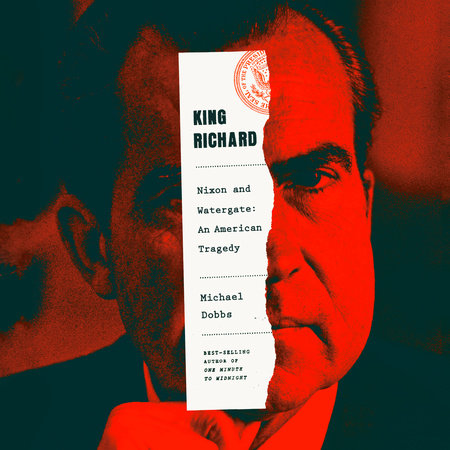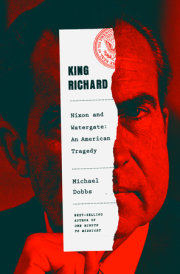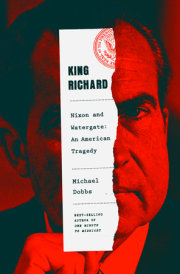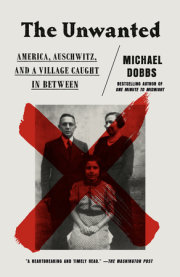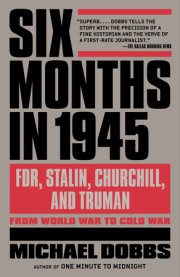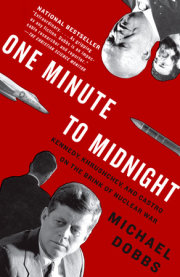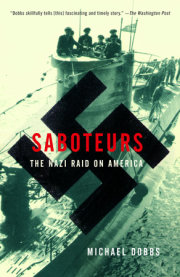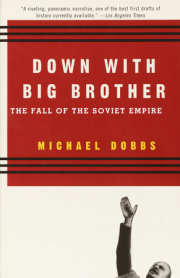Saturday, January 20, 1973 | Inauguration Day
It had been “one helluva show.” The Grieg piano concerto, in particular, had been a revelation. Van Cliburn was superb: no one could match his virtuosity. Of course, most of the Republican high rollers who feasted on colonial roast duckling and plantation pineapple in their tuxedos and long dresses—“clowns,” in Richard Nixon’s estimation—“did not know what the hell was going on.” But the president had thoroughly enjoyed both the music and the political symbolism of the evening.
His arrival at the Kennedy Center had been heralded with “ruffles and flourishes” from sixteen military trumpeters in full Ruritanian regalia. The orchestras at each of the three inaugural concerts had blared out “Hail to the Chief” as he entered the presidential box, as per an “action memo” from his chief of staff, H. R. “Bob” Haldeman. Best of all, he had succeeded in “sticking it to Washington” by excluding the dreary, politically correct National Symphony Orchestra from the festivities. Instead, he had brought the outspokenly conservative Eugene Ormandy down from Philadelphia to conduct the rousing finale to a wonderful event.
The clanging church bells and simulated cannons of Tchaikovsky’s 1812 Overture were still reverberating in Nixon’s ears as he said good night to the evening’s guest of honor, Mamie Eisenhower, at the front door of the White House. He took the mirror-paneled elevator to the residence on the second floor and then headed left through a succession of grand hallways lined with books and paintings to his private den in the far corner of the mansion. This was the Lincoln Sitting Room, the smallest room in the White House and his personal favorite. The cozy Victorian parlor was the place where he did his best thinking and writing, scribbling his ideas onto yellow legal pads to the booming strains of Victory at Sea. He settled into his plush Louis XV–style armchair, a birthday present from his wife Pat, resting his feet on the matching ottoman. A black-and-white print of the Lincoln family hung on the wall above his head, next to the window, which provided a perfect picture frame for the floodlit Washington Monument.
Snug in his sanctuary, Nixon gazed into a crackling fire set by his personal valet, Manuel “Manolo” Sanchez. He was still dressed in the tuxedo he had worn to the Kennedy Center, offset by black bow tie and gleaming presidential cuff links. His hair, dark brown with splotches of gray, was carefully brushed back, a sartorial choice that emphasized his receding hairline and protruding widow’s peak. His already thick jowls had filled out even more during his first four years in office. Combined with his darting eyes, they gave him a tortured look, as if he were perpetually brooding over past slights and disappointments. The upturned, slightly twisted nose, on the other hand, suggested a bumbling American everyman, like Walter Matthau in a goofy Hollywood comedy. Assembled together, it was a face that was neither handsome nor ugly, distinguished nor plebeian. But it was certainly memorable.
It was already past midnight, but the thirty-seventh president of the United States had no desire to sleep. In less than twelve hours, at noon, he would be appearing on the steps of the Capitol to deliver his second inaugural address. He was still tinkering obsessively with the text. “As I stand in this place so hallowed by history, I think of others who have stood here before me,” read one of his last-minute tweaks. Another note reflected his determination to scale back the Great Society that his Democratic predecessor, Lyndon Johnson, had devoted so much energy to constructing: “our goal for government—to take less from people so that people can do more for themselves.”
Nixon read through the speech once more, fountain pen in hand, marking the passages he wished to emphasize in dark blue ink. He underlined some phrases and scratched in a few additions, until the text resembled a heavily annotated sheet of music. He had issued strict instructions that the speech not go “a word over 1200 words.” As with so many of his peremptory commands, the order had gone unfulfilled, largely due to his own contradictory impulses. He had planned to emulate Abraham Lincoln—who had used just 701 words for his second inaugural address, one of the most memorable in American history—but there was too much he wanted to say. In the end, he had settled for a speech of 1,800 words, still reasonably short by modern-day presidential standards. He calculated that it would take sixteen minutes to deliver, including applause.
As he prepared to take the oath of office for the second time, the son of the struggling Quaker grocer had many reasons to celebrate, despite his perpetually restless nature. He had been reelected by the largest margin of popular votes of any president in the nearly two-hundred-year history of the Republic. He had won the grudging respect of the foreign policy crowd—that despised band of elitist snobs—for the geostrategic brilliance of his opening to China. Most gratifying of all, he was on the cusp of concluding a peace agreement with the Communist government of North Vietnam, heralding an end to a war that had cost the lives of fifty-eight thousand Americans and countless Vietnamese. Four years previously, in his first inaugural address, he had described the “title of peacemaker” as “the greatest honor history can bestow.” The road to peace had been long and bloody, but the prize was finally within his grasp. The initialing of the peace accords was set for January 23, just three days away, in Paris.
Of course, the Nixon haters were still out in force. They had seized on the bizarre scandal spawned by the attempted bugging of Democratic Party headquarters in the Watergate office building back in June 1972—“a third-rate burglary attempt,” the White House spokesman Ron Ziegler had termed it—to cast a shadow over his smashing reelection victory. There had been sensational stories in the press alleging a link between the White House and the hapless band of Cubans caught in the act of breaking in to the Watergate. But the trail seemed to be petering out. The burglars were refusing to provide the names of the mysterious higher-ups who had set the plot in motion. Important witnesses had developed amnesia. Even The Washington Post, which had covered the scandal most aggressively from the beginning, was running out of leads to pursue. A special inaugural section of the newspaper titled “The Nixon Years” did not contain a single mention of the dreaded word “Watergate.”
Unable to sleep, and excited by the prospect of four more years in the White House, Nixon was eager to share the moment with “the son I never had.” He lifted the receiver of the telephone on the polished mahogany coffee table beside him and was instantly connected to an operator.
“Mr. Colson, please.”
The political operative known around Washington for his boast that “I would walk over my own grandmother” to ensure Nixon’s reelection came on the line less than a minute later, at 1:04 a.m.
“Yes, sir, Mr. President.” Despite the late hour, Chuck Colson managed to sound chipper and eager to please. He had evidently been waiting for the call.
“Well, how’d you like the evening?”
Nixon cut off his aide before he could answer the question. He wanted Colson to know that he had practiced the Grieg piano piece as a sophomore in high school, back in California, at a time when he had been “quite advanced in music.” He had never heard it performed better. In the hands of a less skillful conductor, the orchestra could easily have overwhelmed the piano. But Ormandy was superb. He was a fantastic musician and a fantastic man. Word had reached the president that the Hungarian-born maestro had told dissident members of his orchestra—“goddamn left-wingers”—to go to hell when they asked to be excused from the concert as a protest against the Vietnam War.
“Marvelous, that’s marvelous,” enthused Colson.
Formally, Colson had the title of special counsel, but this concealed his true function in the White House, which was to serve as Nixon’s chief political adviser and confidant. The self-described “hatchet man” was accustomed to such late-night calls, which he considered a form of “handholding.” One of his responsibilities was to help Nixon deal with his chronic insomnia and talk himself to sleep. A few months earlier, he had received a 1:00 a.m. call from Camp David, the president’s weekend retreat. Nixon had just returned from Moscow. It was obvious he had been drinking, in addition to taking sleeping pills to fight jet lag. He slurred his words so badly that he was practically incomprehensible. In the middle of the telephone conversation, he passed out. Worried that the president might have injured himself or could even be dead, Colson tried desperately to get back through to Camp David. He could not make a call on his own phone, because the party on the other end—Nixon—had not hung up. Rushing out into the night, he woke up a neighbor and managed to reach Manolo Sanchez, who went to investigate. After a few minutes, the valet reported back: the commander in chief was snoring peacefully.
This time, Colson had no difficulty understanding his boss. Both men viewed the inaugural festivities as an opportunity to promote a new conservative majority in the country that had cleaved off great chunks of the old Democratic coalition. They had already made inroads into the Democratic power base in the Old South by appealing to white voters alarmed by the gains of the civil rights movement. Colson had now set his sights on the labor unions, allied traditionally with the Democrats. He wanted to bring pro-Nixon union leaders to the front of the presidential reviewing stand on Pennsylvania Avenue one by one so they could stand alongside the president as he took the salute at the parade. It would be a visible demonstration of a seismic shift in American politics. Soon, the Democrats would be left with just the blacks, the poor, the intellectuals, and a “lavender shirt mob” composed of “homos and queers.”
Nixon could see the value of giving the defectors their moment in front of the television cameras. Those two and a half hours on the reviewing stand could be mined for “a hell of a lot of gold.” But he was worried about being caught chatting with a supporter when he should be saluting the flags carried aloft by the marching bands.
“You see, I’ve got to stop every two minutes to put my hand on my heart as the flag goes by,” he reminded Colson, his deep baritone voice tinged with irritation. He wanted to make sure that actual conversation was kept to a minimum. Wives must definitely be excluded.
Colson reassured him. “We won’t do too much of it, but I think a little bit of it would be a nice touch . . . I believe that the New Majority is there, Mr. President. I really do.”
The conversation turned to Nixon’s controversial decision to launch a massive bombing campaign against North Vietnam over Christmas. For eleven tension-filled days, waves of American B-52s supported by thousands of tactical aircraft had pounded North Vietnamese ports and airfields and power plants, as well as air defenses around Hanoi. The North Vietnamese had earlier agreed to release all American prisoners of war and permit the anti-Communist South Vietnamese leader, Nguyen Van Thieu, to remain at least temporarily in office. They refused to make further substantive concessions but did allow some token modifications to the peace agreement that were sufficient for Nixon to claim he had achieved his goal of negotiating a “peace with honor.” His toughness had been vindicated. The huge sacrifices of the last four years, including a further twenty-one thousand American lives, had been justified. That, at least, was how Nixon saw it.
It had not been easy. Even his national security adviser, Henry Kissinger, had wavered toward the end beneath a firestorm of criticism of the bombing from Congress and the media. Had Nixon given in to the critics, “the goddamn war” would have continued for months if not years, and thousands more Americans would have been killed. There was one outstanding problem: that “son of a bitch Thieu” was threatening to boycott the signing ceremony in Paris because he mistrusted Communist promises of an end to hostilities. But Nixon believed that his South Vietnamese ally would cave when threatened with a cutoff in American aid. Thieu was not about to “commit suicide.”
“We go ahead and make our deal,” he told Colson. “We sink Thieu and everybody says, ‘Thank God [Nixon] was a tough son of a bitch on both sides.’ The hell with them.”
“That’s right,” Colson chimed in. “We accomplished our objectives.”
Once “peace with honor” was achieved, Nixon continued, it would be Colson’s job to stick it to the antiwar people, both on Capitol Hill and in the country. “We just pour it right to ’em.”
It was the kind of assignment the hatchet man relished. A bespectacled former marine captain with a mischievous grin, Colson shared the president’s disdain for the “East Coast elite,” even though he was himself the product of a top New England prep school. He liked to boast that he had turned down a full scholarship to Harvard, choosing instead to attend slightly less prestigious Brown University, where he became a champion debater and leader of the Young Republicans. He was proud of his reputation for political ruthlessness, summed up by the Teddy Roosevelt quotation he kept in the den of his house: “When you’ve got ’em by the balls, their hearts and minds will follow.” The president knew he could rely on Colson to carry out his orders without question—unlike some other aides, who would prevaricate when asked to do something that seemed impractical or illegal. He had put Colson in charge of “dirty tricks,” such as tracking down photographs of Edward Kennedy dancing with starlets or harassing the leakers of secret government documents. He praised his forty-two-year-old assistant for having “the balls of a brass monkey.” For Nixon, Colson was “Mr. Can-Do.”
Although the hour was late, Nixon wanted to give his most appreciative audience a preview of his inaugural address. He flicked through the large-font, double-spaced copy he had been marking up and began reading his favorite portions aloud.
“The stuff on the world is good. I mean, it’s very strong,” the president enthused. “The time has passed when America will make every other nation’s conflict our own or make other nations’ future our responsibility or presume to tell the people of other nations how to manage their own affairs . . . Get the point?”
“Yes, sir. Yes, sir.”
“Abroad and at home, the time has come to turn away from the condescending policies of paternalism, of Washington knows best.”
“Oh, great.”
Copyright © 2021 by Michael Dobbs. All rights reserved. No part of this excerpt may be reproduced or reprinted without permission in writing from the publisher.

